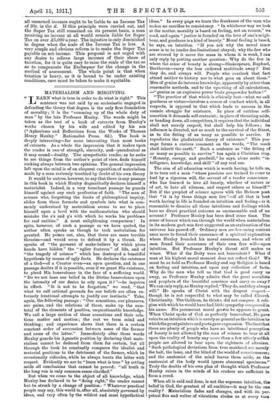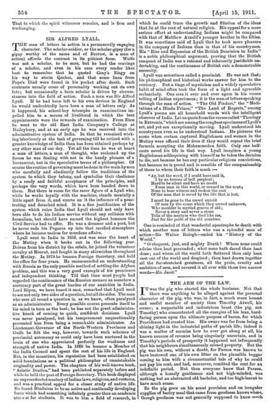MATERIALISM AND MISGIVING.
" LEARN what is true in order to do what is right." This
sentence was not said by an ecclesiastic engaged in defending the theory that dogma is the only firm foundation of morality ; it is the "summing up of the whole duty of man" by the late Professor Huxley. The words might be taken as the text of a book of extracts from Huxley's works chosen by his wife and edited by his son (" Aphorisms and Reflections from the Works of Thomas Henry Huxley." Rationalist Press. 6d.). The book is deeply interesting—far more interesting than most books of extracts. As a whole the impression that it makes upon the reader is one of strength, sincerity, and—paradoxical as it may sound—duality. The sympathetic reader, as he seeks to see things from the author's point of view, finds himself rocking always between two opinions. The general impression left upon the mind is of an eloquent exposition of materialism made by a man seriously troubled by doubt of his own theory
It would be untrue, however, to say that there is any passage in this book in which Huxley dogmatically declares himself a materialist. Indeed, in a very trenchant passage he guards himself against any such profession of faith. "The man of science who, forgetting the limits of philosophical inquiry, slides from these formula; and symbols into what is com- monly understood by materialism seems to me to place himself upon a level with the mathematician who should mistake the r's and y's with which he works his problems for real entities." A most enlightening comparison ! In spite, however, of such a passage as we have quoted, the author often speaks as though he took materialism for granted. He points out, also, that there are more terrible theories—and would seem to defend it by a threat. He speaks of "the garment of make-believe by which pious hands have hidden" the "uglier features" of life, and of "the tragedy of science" which has destroyed a beautiful hypothesis by means of ugly facts. He declares the existence of a God—of a Creator even—an open question, and in one passage doubts if it is possible, even if we grant His existence, to plead His benevolence in the face of a suffering world. " Do we not base our belief in the Divine benevolence upon the intensity of our desire to rely upon it P "—he inquires in effect. "It is not to be forgotten," we read, "that what we call rational grounds for our beliefs are often ex- tremely irrational attempts to justify our instincts." Take, again, the following passage : " Our sensations, our:pleasures, our pains, and the relations of these, make up the sum- total of the elements of positive, unquestionable knowledge. We call a large section of these sensations and their rela- tions matter and motion ; the rest we term mind and thinking ; and experience shows that there is a certain constant order of succession between some of the former and some of the latter." Immediately after these words Huxley guards his Agnostic position by declaring that mate- rialism cannot be deduced from them for certain, but all through the book he constantly compares the idealist and material positions to the detriment of the former, which he occasionally ridicules, while he always treats the latter with respect. Evidently we are to "learn what is true" by setting aside all conclusions that cannot be proved: "all truth in the long run is only common-sense clarified."
But when we come to the object of all knowledge, which Huxley has declared to be "doing right," the reader cannot but be struck by a change of position: " Whatever practical people may say, this world is, after all, absolutely governed by ideas, and very often by the wildest and most hypothetical ideas." In every page we trace the frankness of the man who makes no sacrifice to consistency. " In whichever way we look at the matter, morality is based on feeling, not on reason," we read, and again " justice is founded on the love of one's neigh- bour, and goodness is a kind of beauty." Moral feeling is based, he says, on intuition. "If you ask why the moral inner sense is to be (under due limitations) obeyed; why the few who are steered by it move the mass in whom it is weak, I can only reply by putting another question: Why do the few in whom the sense of beauty is strong—Shakespeare, Raphael, Beethoven—carry the less endowed multitude away ? But they do, and always will. People who overlook that fact attend neither to history nor to what goes on about them." Men of genius do increase knowledge, apparently by other than reasonable methods, and to the upsetting of all calculations, —" genius as an explosive power beats gunpowder hollow !"
"The practice of that which is ethically best—what we call goodness or virtue—involves a course of conduct which, in all respects, is opposed to that which leads to success in the cosmic struggle for existence. In place of ruthless self- assertion it demands self-restraint; in place of thrusting aside, or heading down, all competitors, it requires that the individual shall not merely respect, but shall help his fellows ; its influence is directed, not so much to the survival of the fittest, as to the fitting of as many as possible to survive. It repudiates the gladiatorial theory of existence." This pas- sage forms a curious comment on the words, "The meek shall inherit the earth." Such a sentence as "the fitting of as many as possible to survive " has again a Christian ring. "Honesty, energy, and goodwill," he says, alone make "in- telligence, knowledge, and skill " of any real use.
The aim of all education which is worth having, he tells us, is to turn out a man "whose passions are trained to come to heel by a vigorous will, the servant of a tender conscience who has learned to love all beauty, whether of nature or of art, to hate all vileness, and respect others as himself." But if the prophet of science agrees with the Hebrew poet that "it is by these things men live "—if all that is best worth having in life is founded on intuition and feeling—is it reasonable to dismiss all those intuitions and feelings which have no direct practical outcome as unreasonable and of no account ? Professor Huxley has been dead some time. The sense of horror which ran through the world when materialism in its modern garb was first suggested as an explanation of the universe has passed off. Ordinary men are becoming content once more to found their assurance of a spiritual explanation where Huxley founded his moral assurance, and where all men found their assurance of their own free will—upon intuition. But Professor Huxley's threat still makes us wince. What if the Deity were not benevolent ? What if man at his highest moral moment does not reflect God P We must be as bold as Professor Huxley and say Religion is based on feeling and intuition, not upon any collection of facts. Why do the men who tell us that God is good carry us away, as Professor Huxley admits that the great moralists and prophets of the beautiful convince and carry us away P We can only reply, as Huxley replied," They do, and they always will." He speaks of Christ with the deepest respect— though be is not respectful to what may be called Church Christianity. The Galilean, he thinks, did not conquer. A reli- gion with which he would have had little sympathy conquered in his name. His paramount moral genius he appears to grant. When Christ spoke of God as perfectly benevolent, He gave voice to an intuition which is surely as general as the intuition to which the great painters and poets gave expression. Th e fa c t that there are plenty of people who have no intuitional perception of beauty is not allowed by the man of science to bear at all upon the reality of beauty any more than a few utterly selfish people are allowed to bear upon the rightness of altruism. " Such pathological deviations from true manhoad are merely the halt, the lame, and the blind of the world of consciousness; and the anatomist of the mind leaves them aside, as the anatomist of the body would ignore abnormal specimens." Truly the doubts of his own plan of thought which Professor Huxley raises in the minds of his readers are sufficient to form a creed.
When all is said and done, is not the supreme intuition, the belief in God, the greatest of all realities—it may be the one reality P Materialism fades and changes, and with its per- petual flux and welter of vibrations eludes us at every tarn That to which the spirit witnesses remains, and is firm and unchanging.





































 Previous page
Previous page